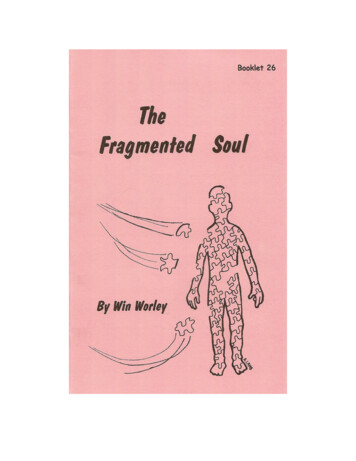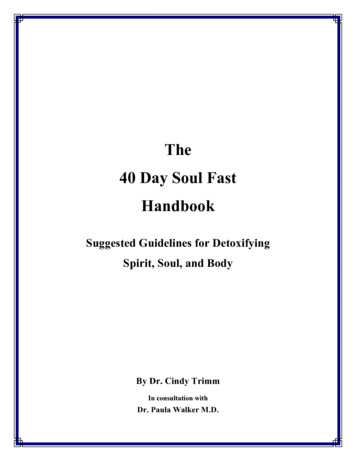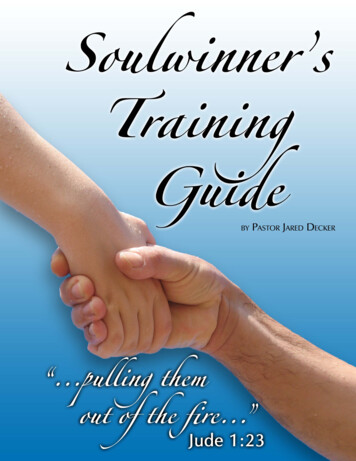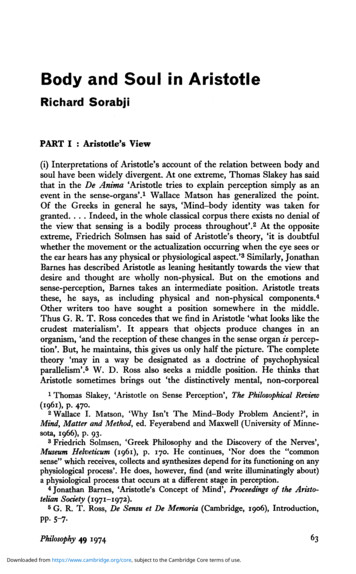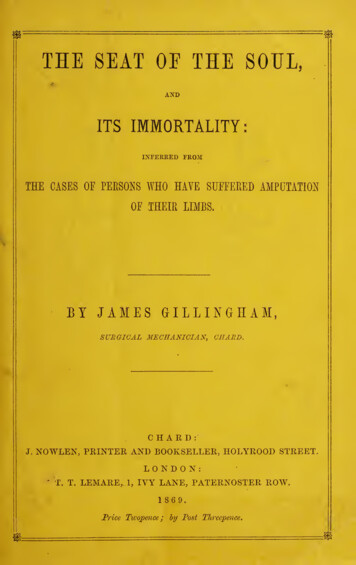
Transcription
--- THE SEAT OF THE SOUL,ANDITS IMMORTALITY:INFERRED PROMTHE CASES OE PERSONS WHO HAVE SUFFERED AMPUTATIONOF THEIR LIMBS.BY JAMES GILLINGHAM,SURGICAL MECHANICIAN, CIIARI}.CHARD:J. NOWLEN, PRINTER AND BOOKSELLER, HOLYROOD STREET.LONDON:' T. T. LEMARE,, 1, IVY LANE, PATERNOSTER ROW.1 8 6 9.Price Twopence; by Post Threepence.am
The above Engravings are illustrative of the first case—that of thegamekeeper—referred to on page 3.The patient had an ArtificialArm made and applied by the author of this pamphlet, from whomProspectuses, with Testimonials, &c., may be had on application.
THE SEAT OF THE SOUL,ANDITS IMMORTALITY:INFERRED FROMTHE CASES OF PERSONS WHO HAVE SUFFERED AMPUTATIONOF THEIR LIMBS,BY JAMES GILLINGHAM,.SURGICAL MECHANICIAN, CHARDCHARD:J. NOWLEN, PRINTER AND BOOKSELLER, HOLYROOD STREET.LONDON:T. T. LEMARE, 1, IVY LANE, PATERNOSTER ROW.1 8 6 9.
tj * i 3 8Waa7oo/ 8 G *9& G8
THE SEAT OE THE SOUL,ANDITS IMMORTALITY.“ Hath man a soul ? ” and “ Where is its seat ? ” are questions that havebeen asked in all ages.Galen, in his time, supposed the brain to be the seat of the soul. Harvey,in his time, believed the spirit to be in the blood,—the blood being con sidered to be the life of the man. Many are the opinions in reference tothese great questions; to which I am about to suggest another, which, how ever, I do not offer as new in every respect.I infer from the following facts, that the spirit and the body are of thesame shape, and that the soul dwells in every part of the material man, whilethe head is the centre of action.I will offer, firstly, facts gleaned from patients who have suffered amputa tion of their limbs; secondly, the truths I think these facts teach fromreason; and, thirdly, the testimony given by Revelation in bearing out thetruth which reason asserts.The cases of the patients referred to are as follows :—The first case is that of a gamekeeper in the employ of Viscount Bridport, whohad his arm blown off whilst ramming home a charge of powder into a cannon,which accident necessitated the amputation of the limb at the shoulder-joint. Fiveyears have passed away, and during this period the keeper’s arm has mouldered todust in the churchyard; still he feels that he has a hand and arm, though the mate rial part is removed. Indeed, he feels his hand plainer than ever. He can put hishand in any position, or move any particular joint he thinks proper. He will holdhis (spiritual) hand up before his face, and say, “ My hand is before my eyes. I can not see it; but I know it is there, because I can feel it.” He says, too, that he couldgrasp a tool and use it, as he once did; but he cannot, because the material part thespirit once acted upon is amputated.The second case is that of a patient who had his leg amputated at the middle ofthe thigh, in consequence of a white swelling of the knee. He feels his leg and footvery sensitive, though the material part is removed. Shortly after the operation hegot out of bed one morning to dress, and put out his leg to walk, unconscious of hisloss, when suddenly he found the material pillar that had so long supported himremoved, and he was obliged to grasp the first thing that came in his way, to savehimself from falling.
4The third case is that of a patient who had his foot torn off in a thrashingmachine seventeen years ago. He still feels his foot, which is very sensitive, to thepresent time.The fourth case is that of a patient who had both his hands blown off whilstramming home a charge at the month of a cannon. He was taken home shortlyafter the accident, and they were about to carry him upstairs, when he expressed awish to walk up. In ascending the stairs, not thinking for the moment that hishands were off, he stretched out his arms to grasp the baluster, when suddenly heexclaimed, “ Oh God ! I have lost my hands ! ”The fifth case is that of a patient who had his leg amputated, or taken out of thesocket, at the hip-joint. I asked him, whilst he was lying in the hospital, whetherhe felt his foot and leg. His reply was, “ Yes; more so than I do the sound limb.”The sixth case is that of a patient who had his leg taken off under the knee, owingto an injury caused by the explosion of a gun. He says: “ I still feel that I have aleg which I can never lose; and have many a time put down my hand to feel it,when suddenly I have found myself grasping an insensible piece of wood.”The seventh case is that of an old man with a wooden leg, whom I met by theway. “ Well, my man,” I asked, “ can you feel your foot ? ” “ Yes, sir,” repliedhe, “and my ankle too, as sensitive as ever.” “How long have you lost your leg ?”“ Over forty years.”The eighth case is that of a patient who had suffered the amputation of his leg, inconsequence of a white swelling, when eighteen years of age. He departed this lifenot long since at the age of seventy-two. I knew him personally. I was anxiousto know whether, after he had lost his leg fifty-four years, time had worn out thissensitive feeling. On my inquiring of his daughter, she said she had heard herfather say that he had many a time felt his leg, and that in his last illness the limbbecame more sensitive than ever. When he turned in bed, and moved one leg, hemoved the other also.The ninth case is that of a patient who has had his shoulder-blade and arm takenout altogether. He now lives, and enjoys health. I had been corresponding -withhim a short time, and was very anxious to know whether the taking away so largea portion of the body cut off the connection of the feeling of the hand and arm. Itook the liberty of asking him. He kindly replied, and said : “ All that can be saidof the gamekeeper can be said of me. I feel my hand and arm plainer than ever.By day my arm is close to my body, and my hand rests upon my hip; but by nightmy hand and arm rest over my chest.”The tenth and last case I offer is that of a boy nearly fifteen years of age, who hadboth his legs cut off by an engine running over him on the Great Northern Railwayat Lincoln. One leg was cut off above the knee, and left on the line; the other justunder the knee, and left suspended by a piece of skin. The boy was perfectly sen sible, and while on the stretcher at the hospital he was asked where the accidenthappened. In reply he said, “ Let me jump up, and I will run and show you.” Afew weeks after the operation he got out of bed one morning to dress, not know ing that he had lost his legs, consequently he fell on the two ends of his stumps,which were much injured.Many other cases might be given; but the foregoing will suffice. I willnow come to the second part of my subject, namely, the truths which theabove facts teach from reason.Do they not teach this: that the spirit dwells in every part of the man,while the head is the centre of action ? The material man and the spiritualman have the same shape. The body is a compound; it can be separatedand destroyed. The spirit is an indivisible and substantial being, and can-
5not be destroyed; for where there can be no separation, there can be nodestruction. The spiritual man remains perfect when a part of the materialman has been removed by amputation. When the material arm is separatedfrom the body, the spiritual arm is not separated, but remains connectedwith the spiritual man. Thus it is that a patient feels his limbs, though thematerial part be removed. It is the spirit which feels, and not the matter.Man is clothed in a material body, in harmony with a material world; andhe is connected with it by his physical existence. The nerves of his bodyare the medium of communication between matter and spirit, and connectman to a natural world. But when the body, with its nerves, is thrown offby death, there remains no longer any connection or communication withthe natural world; and then the spiritual man takes his flight to a spiritualscene of action.Some may be ready to say that they cannot see the spiritual limbs of thosewho have suffered amputation of the material part. Because we see themnot, is no proof that the limbs are not. We cannot see the spirit of a friend,as he takes his flight the moment after death. Stand by his bedside: youlisten to his last counsel—you see the quickness of his perception and theintelligence that beams from his eyes. The closer death approaches uponthe clay, the more conscious and spiritual your friend becomes; but whileyou stand and take the last farewell, the spiritual, thinking man quits thebody, and you look upon a corpse. From the fact that you did not see yourfriend on his flight, would you say he is not ? Why did you not see himafter he left the body p Simply because you looked through a materialorgan—the natural eye; and it is impossible for us, with natural sight, tosee a spirit, though the spirit of a departed one, like the spiritual arm thathas lost the material part, may be close at our side.Some say this feeling is the effect of imagination. We often imaginethings; but we are conscious that they are not real, and, like clouds, theysoon pass away. But this feeling is a reality, and cleaves to its possessor tothe last' moment of life. Not only so; but in all cases of amputation thefeeling that applies to the hand, applies to the foot, and that which appliesto the foot applies to the taking off both legs, or extracting the shoulderblade ; and that which applies to the taking away so large a portion of thebody, applies to the whole material body. And if a man feels his arm or legwhen the material part has slumbered in the grave fifty years, shall he notfeel his whole spiritual man when the material part has slumbered in thegrave a thousand years p It matters not how large a portion of the body betaken away—it does not annihilate the spiritual feeling; and it matters nothow long since the limb may have been amputated—time does not wear thisfeeling out.Further; the spiritual man and the material man are so mysteriously con nected, that the spirit affects the body and the body affects the spirit. Inhealth, the unity of the two is perfect, and they are in sympathy with eachother; yet see how the prick of a pin will disturb that unity! The cold andthe heat coming in contact with the body affect the spirit; and the patientwho has suffered amputation of a limb feels this change of temperature inthe limb amputated as it becomes more sensitive ; and just before death thelimb amputated becomes more sensitive than at any period during life. Howremarkable ! that which is true of part of the spiritual man before death is
6true of the whole; and, although the spirit dwells within the material body,yet it is not of it; but as death approaches, the spirit seems conscious, andexults in being freed from the clay.Some say this feeling is the effect of memory. How so ? I can rememberthe things that occurred in my youth. I can see at this moment, with mymind’s eye, the fields in which I rambled, and can depict in my mind thehappy faces of those with whom I spent many a playful hour. Several ofthem have gone to their rest; yet, with my mind’s eye, I see them. But thebody which, philosophically speaking, I possessed then, I possess not now.My material man has, since then, undergone a change ; yet I am confidentthat I am the same individual, spiritually. If I had suffered, during thattime, the amputation of a limb, it could not effect a change in my spiritualman; for the spiritual part would still remain sensitive and perfect. Thebody changes every seven years; so the man who has lived seventy yearshas lived in ten different (but similar material) bodies. Though the mate rial man has been constantly changing, the spiritual man is unchanged andthe same. The decomposition of the body during life is similar to its decom position after death: in the former case the body is seven years decompos ing ; in the latter but a few weeks.Others say that this feeling after amputation is caused by the connectionof the limb with the nerves. How so ? The nerves are as perfect in a deadman as in a living one. If they were not, the student would fail in his dis sections. But there is no feeling in a dead man or dead body. And why ?Because it is no longer inhabited by the spiritual man, but the body, withits nerves, through death has become mere physical matter. Nerves are notlife, but the medium through which the spirit acts, to stimulate (throughthe power of the will) the muscles of the body into action, in order that manmay be enabled to fulfil his earthly calling. For “ it is not in flesh to think,nor in bones to reason.”Nerves are not spirit, any more than wires are electricity. The wires arebut the medium through which electricity passes. But what is electricity ?We cannot say. Then, because the ablest philosopher cannot answer the ques tion, would it not be madness to say there is no such thing, when we havesuch demonstrative evidences of it P And none but a madman would presumeto say that there is no such thing as a living soul, simply because he cannotanswer the question, “ What is life ?” the evidence of which we have within.Further: this sensitive feeling not only applies to patients who have suf fered the amputation of a limb, but also applies to those who have becomeparalysed. I knew a young person suffering from a spinal complaint, whichdisease so affected the nerves proceeding from that part, that the lower ex tremities became dead or paralysed.She felt that she had legs, which werevery sensitive; but you might pinch or pierce her material legs, and therewas no more feeling in them than if you had pierced a block of wood.Though the material limbs were on the body, the unity existing betweenthem and the spirit became separated ; but the spiritual limbs were sensi tive to the last moments of life.Sometimes a tumour forms on the brain : it affects a nervous centre, whichrenders the whole of one side of the body paralysed or dead. You may brandwith a hot iron, or pierce the body on that side, and there is no feeling. Thelimbs here are not amputated—the nerves are all connected. There is no
7feeling in the part paralysed, notwithstanding its connection with the otherpart of the body. Still it is a stern fact that the patient can feel that halfof the spiritual body, though the material part be dead. It is the spirit thatfeels ; there is no feeling in matter.Further testimony can be given from reason to prove that the spiritualman inhabits every part of the material body, and, consequently, must havethe same shape ; but is more beautiful, as it exists in a much higher degree.A blind man can see, even when the material organ is taken away. Heno longer sees natural objects, because he is deprived of the natural organ;still he sees with the eye of the spirit, the material part of which is removed.And it is that eye by which (when freed from all that is material) we shallrecognize and identify each other in a spiritual state.In the hour of death we often have evidences of persons seeing with thespiritual eye when the natural eye has become dim. I give a case that hascome under my notice : A mother was watching at the death-bed of herbeloved daughter, who was not delirious, but calm and composed in spirit.Just before death she said, “ Mother—dear mother—do you see those beau tiful angels F ” “ Where, my child ? ” “ There, mother,” pointing with herfinger, “ Hark ! mother; hark ! Do you hear that sweet music ?” “ No, mychild.” “ Look again, mother; do you not see those beautiful angels ? Theyare beckoning—they are coming for me. Quick ! mother—good bye ! ” Shestretched out her hand, took the last farewell, and her happy spirit left theclay to enjoy the society of the just made perfect. The spirit had partlyentered heaven before it had left the body. May it not be said that theChristian realizes heaven before he comes into full possession of it P And isnot this the case also with the wicked P Just before death they realize theterrors of hell, even before they have left the natural body. They see thespirits of those whose consciences are smeared with the blood of their darkdeeds, and all the terrors of hell loom up before them; so that they enterits gloomy portals before they have left the natural world.A deaf man can hear, though the drum of the ear be destroyed; he canhear inwardly with the spiritual ear.A dumb man can speak inwardly with his tongue, though he cannot arti culate a single sound with his material tongue.And a man who is blind, deaf, and dumb can think, see, hear, speak, andact, and so understand his Creator as to lift up his soul to Him in adorationand praise.I have given the truth which reason dictates : others may think differentlyfrom myself, which they are quite at liberty to do. The facts have comebefore my notice, and I have gleaned and given them for the information ofthe reader; and I have also given the inferences from them. I will nowpass to the third part of my subject; but before so doing, I will make a fewremarks in reference to the objections that may be raised against this trainof reasoning.Some may be ready to ask the question, “ Will not some of these argu ments apply to animals ? ” To this I answer in the words of others.Butler says : “ Animals may have a natural immortality peculiar to them selves ; but not a moral and intellectual sensibility. The present economyof nature requires such creatures (we could not do without them), and weknow not what may be required in the next state of our existence.”
8Another author says : “ The animals of creation come more nnder thephysical law—they consequently can never do wrong; but man is a moralcreature, and therefore responsible at the bar of a higher tribunal.”There is nothing monstrous in believing in the immortality of animals.We may find in insect life many striking illustrations of the change thatmust pass over us. One of these I give, which has come under my ownnotice, as well as under the notice of others. There is often to be seen inour soft-water cisterns a little red worm. Its specific gravity is equal tothat of water : that is, it can either descend to the bottom or ascend to thetop. As a worm, it is constituted for the element in which it lives, with abody in harmony with its present state of existence. After it has lived ashort time in the water, and has done its work, as all insects have theirmission to fulfil, it comes up to the surface of the water, and loses its speci fic gravity, and cannot descend to the bottom. Its body has become lighterthan water, and it floats on the surface. The head of the worm daily be comes enlarged, until it bursts, and from the worm emerges a beautiful fly,which, when viewed through a microscope in the eye of the sun, is clothedwith a brilliancy which glistens more brightly than the jewels of any earthlydiadem. The body of the fly is very similar in form to that of the wormfrom which it has emerged, but still more beautiful. As the fly bursts forthit leaves the form of the worm, or the old clothing, on the surface of thewater; while the new-born creature wings its flight aloft to bask in the sun shine of heaven. The worm has now changed its condition : it lives now ina different element, and has a beautiful body in harmony with its state.While a worm, it could not wing its flight upwards; and now it is a fly itcannot go back to its original state—-a worm. This insect offers a strikingillustration of the change which will pass over us. We live in a naturalworld; we have natural bodies in harmony with our state; we are consti tuted for the world in which we live. Light to the eye—air to the lungs—food to the body, &c.Our material bodies are governed by the natural lawsof this world, obedience to which brings its reward, and disobedience bringsits punishment. We have a time to live, and a mission to fulfil on earth.Here we are sowing for eternity, and what we sow here we shall reap here after. Death, when our work is done, creeps upon us; we lose our specificgravity, and there is the tendency upwards—away from earth. We float asit were upon the surface, until our spirits expand and burst forth, leavingthe old clothing upon the surface of the earth; then the spirit wings itsflight away to the spirit world—a bxaghter scene of action, where it possessesa more beautiful body, in harmony with its existence. It then exists intel lectually and substantially, but not materially. We, with our present con stitution, are not fitted for heaven, and cannot go thither; and those who arethere, and are now clothed in beauty, cannot come back to their former state.I will now pass to the third part of my subject, namely, the testimonygiven by Revelation in bearing out the truth which reason asserts.When God created man, He created him from the dust: here he stands amaterial house—dust of the earth. Then God breathed into that materialhouse a spirit—a living soul. Here is the union : soul and body—spirit andmatter. After man’s creation comes his dissolution. Man dies (the naturalman) : his body returns to the dust; but his spirit to the God that gave it.Here again are soul and body—spirit and matter.
9Then there is another death spoken of: spiritual death, which refers notto the natural body, but to the intellectual, thinking being, which can andwill exist independent of the natural body. God’s words to Adam were, “Inthe day that thou eatest thereof, thou shalt surely die; ” but Adam did notdie. What do we understand by this F That Adam became separated fromGod by breaking His command ; and absence from God was spiritual death ;so that Adam died and lived spiritually as a substantial man, independentof his natural body. Again : as in Adam all die, so in Christ all live. Howso ? since all men die (naturally). What does it mean P That as all die inAdam spiritually, so all live in Christ spiritually. “I am,” says Christ, “theresurrection and the life : he that believeth on me, though he were dead, yetshall he live.”What does our Lord mean by this P Man is born in sin and shaped ininiquity; and there was a time when all men, though they lived naturally,were spiritually dead. Our Lord, therefore, meant that those who believed,and lived a life of faith upon Him, should live and never die. He that be lieveth, passeth from death (not natural death) unto life; and death hath nomore power (not over his body) over his soul. “ If a man keep my sayings,he shall never see death”—yet all men die naturally; but Christ meansthat they shall not see death spiritually, which refers to the death of thespiritual, thinking man, and not to the death of the body.The above truth teaches this: that the natural or material man and thespiritual man, though united in the natural world, are apart and separatefrom each other; and that there is a natural body and a spiritual body. Thenatural body is of the earth, earthy—God created man from the dust; thespiritual is from heaven, heavenly—God breathed into man a spirit. Thenatural body returns to the dust—“ For this I say unto you, brethren : thatflesh and blood cannot enter the kingdom of heaven; ” but the spiritualman enters either heaven or hell.We will now turn our thoughts to men individually, as recorded in Scrip ture, and see what evidence is given in bearing out the assertion that thematerial man and the spiritual man are of the same shape.The words of our Lord to the thief on the Cross were these: “ This dayshalt thou be with me in Paradise.” Not his body—the natural man—thatwas left upon the Cross to be committed to the dust; but the intelligent,thinking, acting man, should be with Him in Paradise, and should be thereas a man, substantially, but not materially.The angels that appeared unto men upon the earth appeared as men,spiritually and substantially. The angels that appeared to the Patriarchs,the Prophets, the Shepherds, and the Apostles—they were in countenanceand stature as men. They spoke and acted as men. They had not materialbodies; but they were clothed with celestial light, and were the inhabitants,not of a natural, but of a spiritual world. Surely, then, the spiritual manand the material man are of the same shape.Moses and Elias appeared to Peter and John at the Mount of Transfigura tion. They were represented as the identical men named, with the samecountenances and the same individualities—consequently the same identity—as when upon earth; but their bodies were slumbering in the dust, andhad been for ages. Certainly the material man and the spiritual man musthave the same shape. But how do we know that they really were the men
10represented ? Because it is the testimony of the Spirit, and therefore mustbe true.Then there is the parable of the rich man and Lazarus, which we take asa true figure of our state after death. If we do not take it so, away with itat once ; and if we away with this, why not away with all the rest ? No;we will hold to it and cleave to it; for, although a fiction to convey truth,still it is the testimony of the Spirit, and therefore must be true.The bodies of both these men die, and are committed to the dust; but in aspiritual state they are the same men, unaltered. They are actually thesame men the moment after death as they were the moment before death :sufficient to prove that we shall be the same individuals after death as weare now, and our characters, with all our individualities, whether good orbad, will be stamped unalterably; for he that is holy shall be holy still, andhe that is filthy shall be filthy still.The rich man sees Lazarus, and he sees Abraham, and Abraham, withLazarus, is identified; but Abraham’s body was buried in Shechem centuriesbefore. Abraham must have had the same countenance as on earth. Butdoes the rich man see with his natural eye ? No; that is in the grave; butwith his spiritual eye. He has a tongue—he speaks. His material tongueis in the grave; but he speaks with his spiritual tongue, with which he hasthe full power of speech. Not only has he the power of speech; but he hasthe power to think and the full power of memory. Worms are feeding onhis brain; still he has an active mind—he remembers his father’s house, hisbrethren, and his connection with that household. He has an ear, and Abra ham, who has also the full power of speech, responds to his call; but hismaterial ear is in the grave. He hears with the spiritual ear. It is evidentthat the spiritual man, whether in heaven or in hell, is of the same shapeand form as the material man; for the rich man looks across the gulf to thebetter world, sees Lazarus, and identifies him as the same man that he sawon earth—yet Lazarus’s material face is in the grave : then the spiritual facemust have the same outline of feature to be identified. Therefore the spiri tual man dwells in every part of the material body.Do not the Scriptures give us every reason to believe that we shall meetour friends in heaven P If so, we must have the same outline of countenanceto be identified.If the spiritual man and the material man have the same shape, so that weshall identify each other in a spirit world, then we must identify each otherfrom memory. If so, shall we not remember our associations on earth ? Ibelieve we shall. If I had wronged a fellow-creature, and were to meethim soon after in the spirit world, the first thing that would flash acrossmy mind would be the wrong I had done him ; and this fact would be suffi cient to prove that I was substantially the same man, though my body mightbe mouldering in the grave.If the above be true, what then of all the actions of our life ? What ofthe shuffling, the falsehood, the trickery, and the cheating, which are nowcontinually being practised by our fellow-men ? Ah ! it is not what a manassumes or appears to be, but what he really is in pi’inciple—which mustspring from the inner life. If a man seventy yeai’S of age remembers theactions of his youth, what guarantee has he that he shall not remember thesame a thousand years hence ? Since it is the memory of the intelligent
11thinking man that lives, independent of the natural body, f every man’smemory is his book of life, or the book of his own life,” upon which is en graved—as with a pen of iron upon eternal brass—all the actions of his pastlife, which he will remember whether in heaven or in hell.Some may differ with me on the above assertion, and may believe that aportion of man’s memory is closed, after death, to his evil doings. Was therich man’s memory closed, or Lazarus’s ? If we remember the good, we re member the evil. If we do not remember the one, we do not remember theother; then we cannot remember anything. Then, if we have no memory,we are nobody, and cannot be responsible beings ; consequently there canbe no reward or punishment.In a lost state a man’s sins will add to his misery; as there is no hope ofrecalling them, or of rendering restitution to those whom he has wronged.In a blissful state the remembrance of a man’s life may not, as it may besupposed, mar his happiness; but he will remember, and rejoice in, themercy and grace that has saved him—not that he was more than others, orthat he deserved more; but that he had found eternal life, through Christ,by repentance of sin and obedience to faith. A subject breaks the laws of aking: the king offers certain conditions of pardon, which the criminal ac cepts. Though he has obtained forgiveness, can he ever forget? No; heremembers; but he is not sad—he rejoices in the mercy that saved him.Finding we are all erring creatures, and that everything that is secret shallbe brought to light, may we not ever offer up the prayer, “ 0 Lord, help usto live in Thy fear ? ” then, when we are tempted to do a wrong thing, theremembrance that God’s eye is upon us will be a mighty check upon ourevil doings.Here, on earth, we are building up our life for eternity. The good or evilwe do will follow us, (but not save us.)Here we sow the seed ; hereafterwe shall reap the harvest; and what we sow, we reap. As the tree falls, soit lies; as
man a soul ? ” and “ Where is its seat ? ” are questions that have been asked in all ages. Galen, in his time, supposed the brain to be the seat of the soul. Harvey, in his time, believed the spi
